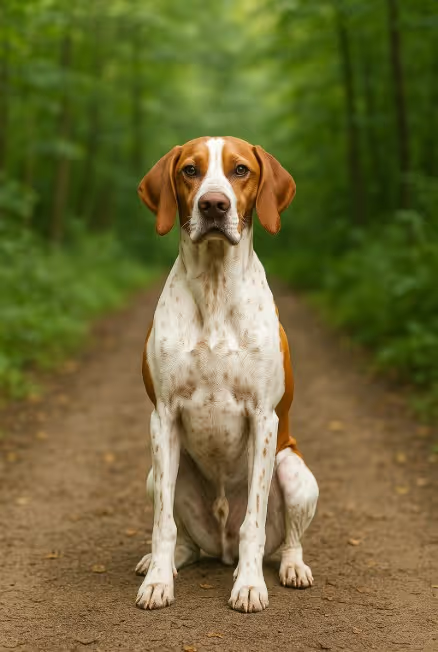The Pointer is a sleek, athletic bird dog bred to locate and indicate upland game with a classic “frozen” stance and level tail. Friendly, biddable, and endlessly energetic, Pointers thrive with active owners who enjoy hiking, running, and field training. Wondering “Are Pointers good family dogs?”—yes, in homes that meet their exercise needs. Curious “Do Pointers shed?”—light to moderate shedding with a short, easy-care coat. Apartment living is possible only with serious daily exercise and enrichment.

Developed in Britain in the 17th–18th centuries from Spanish Pointers and other sporting dogs, the Pointer became the quintessential upland bird dog—quartering fields, locking on scent, and “pointing” birds for gunners. Refined for speed, endurance, and a keen nose, the breed excelled in field trials and remains a favourite with hunters and sport competitors worldwide. Today, Pointers balance life as tireless athletes and affectionate home companions.
An elegant, medium-to-large gundog built for speed and stamina with a short, glossy coat.
Low-maintenance but regular upkeep keeps skin and coat in top shape.
A high-drive athlete that needs purposeful outlets every day.
Eager, sensitive, and scent-driven—keep training positive and purposeful.
Fuel the worker while keeping a lean, field-ready physique.
Generally robust; responsible screening is important.
Seek health-tested, temperament-sound dogs from transparent sources—or consider rescue.
Are Pointers good family dogs?
Yes—affectionate and gentle with proper exercise, training, and supervision around small children due to exuberance.
Do Pointers shed a lot?
Light to moderate. Weekly brushing keeps hair and dander down.
Are Pointers hypoallergenic?
No. They’re low-maintenance, not hypoallergenic.
How much exercise does a Pointer need?
Plan for 60–90+ minutes daily, ideally with off-leash running and scent work in safe areas.
Do Pointers bark a lot?
Typically moderate—more likely to “sing” with excitement. Meeting exercise/mental needs reduces nuisance vocalizing.
Pointer vs German Shorthaired Pointer (GSP)—what’s different?
Pointers are sleek, short-coated specialists for pointing; GSPs are “versatile” (pointing + retrieving/waterfowl). Temperaments vary by lines—meet breeders’ dogs.
Are Pointers good apartment dogs?
Only for highly active owners who provide daily vigorous exercise and enrichment.
Do Pointers get along with cats and small pets?
Prey drive varies—early introductions and management are essential; supervise around small animals.